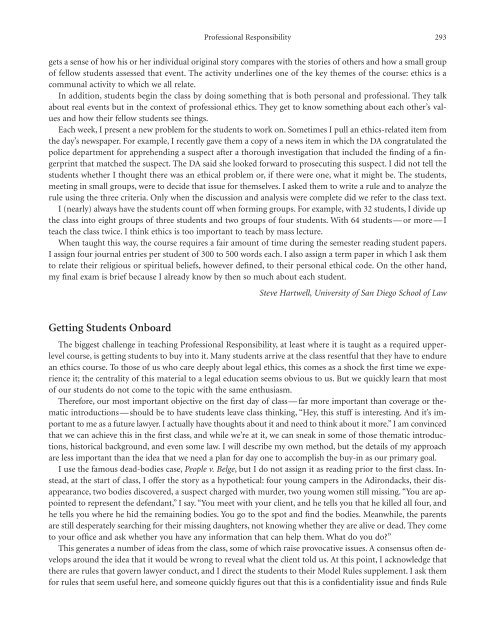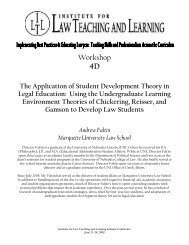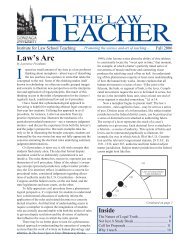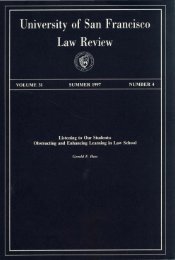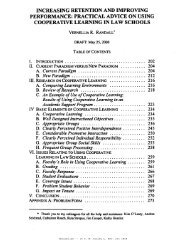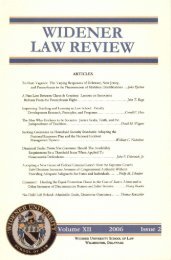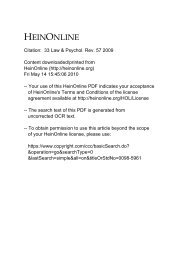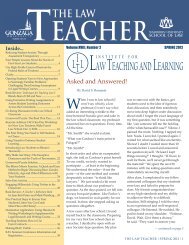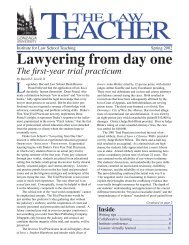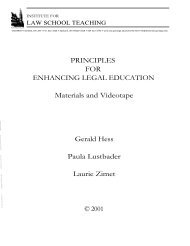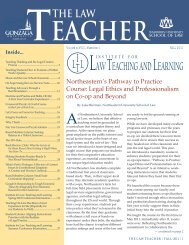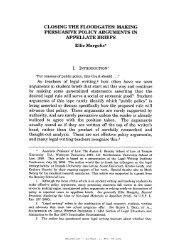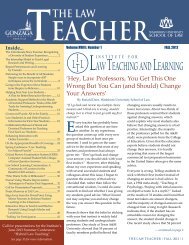Teaching the Law School Curriculum - Institute for Law Teaching ...
Teaching the Law School Curriculum - Institute for Law Teaching ...
Teaching the Law School Curriculum - Institute for Law Teaching ...
You also want an ePaper? Increase the reach of your titles
YUMPU automatically turns print PDFs into web optimized ePapers that Google loves.
Professional Responsibility 293<br />
gets a sense of how his or her individual original story compares with <strong>the</strong> stories of o<strong>the</strong>rs and how a small group<br />
of fellow students assessed that event. The activity underlines one of <strong>the</strong> key <strong>the</strong>mes of <strong>the</strong> course: ethics is a<br />
communal activity to which we all relate.<br />
In addition, students begin <strong>the</strong> class by doing something that is both personal and professional. They talk<br />
about real events but in <strong>the</strong> context of professional ethics. They get to know something about each o<strong>the</strong>r’s values<br />
and how <strong>the</strong>ir fellow students see things.<br />
Each week, I present a new problem <strong>for</strong> <strong>the</strong> students to work on. Sometimes I pull an ethics-related item from<br />
<strong>the</strong> day’s newspaper. For example, I recently gave <strong>the</strong>m a copy of a news item in which <strong>the</strong> DA congratulated <strong>the</strong><br />
police department <strong>for</strong> apprehending a suspect after a thorough investigation that included <strong>the</strong> finding of a fingerprint<br />
that matched <strong>the</strong> suspect. The DA said she looked <strong>for</strong>ward to prosecuting this suspect. I did not tell <strong>the</strong><br />
students whe<strong>the</strong>r I thought <strong>the</strong>re was an ethical problem or, if <strong>the</strong>re were one, what it might be. The students,<br />
meeting in small groups, were to decide that issue <strong>for</strong> <strong>the</strong>mselves. I asked <strong>the</strong>m to write a rule and to analyze <strong>the</strong><br />
rule using <strong>the</strong> three criteria. Only when <strong>the</strong> discussion and analysis were complete did we refer to <strong>the</strong> class text.<br />
I (nearly) always have <strong>the</strong> students count off when <strong>for</strong>ming groups. For example, with 32 students, I divide up<br />
<strong>the</strong> class into eight groups of three students and two groups of four students. With 64 students — or more — I<br />
teach <strong>the</strong> class twice. I think ethics is too important to teach by mass lecture.<br />
When taught this way, <strong>the</strong> course requires a fair amount of time during <strong>the</strong> semester reading student papers.<br />
I assign four journal entries per student of 300 to 500 words each. I also assign a term paper in which I ask <strong>the</strong>m<br />
to relate <strong>the</strong>ir religious or spiritual beliefs, however defined, to <strong>the</strong>ir personal ethical code. On <strong>the</strong> o<strong>the</strong>r hand,<br />
my final exam is brief because I already know by <strong>the</strong>n so much about each student.<br />
Getting Students Onboard<br />
Steve Hartwell, University of San Diego <strong>School</strong> of <strong>Law</strong><br />
The biggest challenge in teaching Professional Responsibility, at least where it is taught as a required upperlevel<br />
course, is getting students to buy into it. Many students arrive at <strong>the</strong> class resentful that <strong>the</strong>y have to endure<br />
an ethics course. To those of us who care deeply about legal ethics, this comes as a shock <strong>the</strong> first time we experience<br />
it; <strong>the</strong> centrality of this material to a legal education seems obvious to us. But we quickly learn that most<br />
of our students do not come to <strong>the</strong> topic with <strong>the</strong> same enthusiasm.<br />
There<strong>for</strong>e, our most important objective on <strong>the</strong> first day of class— far more important than coverage or <strong>the</strong>matic<br />
introductions— should be to have students leave class thinking, “Hey, this stuff is interesting. And it’s important<br />
to me as a future lawyer. I actually have thoughts about it and need to think about it more.” I am convinced<br />
that we can achieve this in <strong>the</strong> first class, and while we’re at it, we can sneak in some of those <strong>the</strong>matic introductions,<br />
historical background, and even some law. I will describe my own method, but <strong>the</strong> details of my approach<br />
are less important than <strong>the</strong> idea that we need a plan <strong>for</strong> day one to accomplish <strong>the</strong> buy-in as our primary goal.<br />
I use <strong>the</strong> famous dead-bodies case, People v. Belge, but I do not assign it as reading prior to <strong>the</strong> first class. Instead,<br />
at <strong>the</strong> start of class, I offer <strong>the</strong> story as a hypo<strong>the</strong>tical: four young campers in <strong>the</strong> Adirondacks, <strong>the</strong>ir disappearance,<br />
two bodies discovered, a suspect charged with murder, two young women still missing. “You are appointed<br />
to represent <strong>the</strong> defendant,” I say. “You meet with your client, and he tells you that he killed all four, and<br />
he tells you where he hid <strong>the</strong> remaining bodies. You go to <strong>the</strong> spot and find <strong>the</strong> bodies. Meanwhile, <strong>the</strong> parents<br />
are still desperately searching <strong>for</strong> <strong>the</strong>ir missing daughters, not knowing whe<strong>the</strong>r <strong>the</strong>y are alive or dead. They come<br />
to your office and ask whe<strong>the</strong>r you have any in<strong>for</strong>mation that can help <strong>the</strong>m. What do you do?”<br />
This generates a number of ideas from <strong>the</strong> class, some of which raise provocative issues. A consensus often develops<br />
around <strong>the</strong> idea that it would be wrong to reveal what <strong>the</strong> client told us. At this point, I acknowledge that<br />
<strong>the</strong>re are rules that govern lawyer conduct, and I direct <strong>the</strong> students to <strong>the</strong>ir Model Rules supplement. I ask <strong>the</strong>m<br />
<strong>for</strong> rules that seem useful here, and someone quickly figures out that this is a confidentiality issue and finds Rule


